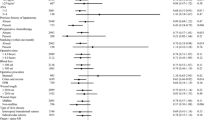Abstract
Background
Among complications after surgery for colorectal cancer, wound infections may prolong hospitalization and increase healthcare costs. This study was designed to clarify the incidence, risk factors, and pathogens responsible for wound infections after surgery for colorectal cancer.
Methods
The study group comprised 144 patients (94 men and 50 women) with colorectal cancer in whom the same surgeon at Kitasato University Hospital performed resection from January 2004 through December 2005. Their mean age was 67.1 years (range = 38–90). To identify risk factors for surgical wound infections, we examined the following 11 variables: gender, age (>65 vs. ≤65 years), body-mass index (>25 vs. ≤25 kg/m2), the presence or absence of diabetes mellitus, physical status according to the American Society of Anesthesiologists classification (ASA score), stage of cancer according to the TNM staging system, surgical procedure (laparoscopic colectomy vs. open colectomy), procedure type (right colectomy vs. left colectomy vs. anterior resection), operation time (>180 vs. ≤180 min), intraoperative bleeding volume (>120 vs. ≤120 ml), and the presence or absence of intraoperative transfusion. Tissue specimens of infected wounds were cultured to identify pathogens.
Results
Postoperative wound infections occurred in 12% (17/144) of the patients. In univariate analyses, the incidence of wound infection was 26% (11/43) in patients who underwent open colectomy compared with 6% (6/101) in those who underwent laparoscopic colectomy. This difference was significant (P = 0.001). In multivariate analyses, only surgical procedure was identified as an independent risk factor for wound infection. The odds ratio for open colectomy compared with laparoscopic colectomy was 3.322 (P = 0.021). Pus from infected wounds was cultured in 7 of the 17 patients and cultures were positive for pathogens in 5 patients: 1 laparoscopic colectomy and 4 open colectomy. Bacteroides species were the most common pathogen.
Conclusion
To prevent wound infections after surgery for colorectal cancer, laparoscopic surgery should be performed when indicated.
Similar content being viewed by others

References
Schoetz DJ, Roberts PL, Murray JJ et al (1990) Addition of parenteral cefoxitin to regimen of oral antibiotics for elective colorectal operations. Ann Surg 212:209–212
Tang R, Chen HH, Wang YL et al (2001) Risk factors for surgical site infection after elective resection of the colon and rectum: a single-center prospective study of 2,809 consecutive patients. Ann Surg 234:181–189
Smith RL, Bohl JK, Mcelearney ST et al (2004) Wound infection after elective colorectal resection. Ann Surg 239:599–607
Malone DL, Genuit T, Tracy JK et al (2002) Surgical site infections: reanalysis of risk factors. J Surg Res 103:89–95
Vamvakas EC, Carven JH, Hibberd PL et al (1996) Blood transfusion and infection after colorectal cancer surgery. Transfusion 36:1000–1008
Mangram AJ, Horan TC, Pearson ML et al (1999) Guideline for prevention of surgical site infection, 1999. Infect Control Hosp Epidemiol 20:250–278
Winslow ER, Fleshman JW, Birnbaum EH et al (2002) Wound complications of laparoscopic vs open colectomy. Surg Endosc 16:1420–1425
Law WL, Lee YM, Choi HK et al (2007) Impact of laparoscopic resection for colorectal cancer on operative outcomes and survival. Ann Surg 245:1–7
Braga M, Vignali A, Gianotti L et al (2002) Laparoscopic versus open colorectal surgery: a randmized trial on short-term outcome. Ann Surg 236:759–767
Abraham NS, Young JM, Solomon MJ et al (2004) Meta-analysis of short-term outcomes after laparoscopic resection for colorectal cancer. Br J Surg 91:1111–1124
Latham R, Lancaster AD, Covington JF et al (2001) The association of diabetes and glucose control with surgical-site infection among cardiothoracic surgery patients. Infect Control Hosp Epidemiol 22:607–612
Ronald T, Lewis RT (2002) Oral versus systemic antibiotic prophylaxis in elective colon surgery: a randomized study and meta-analysis send a message from the 1990s. Can J Surg 45:173–180
Author information
Authors and Affiliations
Corresponding author
Rights and permissions
About this article
Cite this article
Nakamura, T., Mitomi, H., Ihara, A. et al. Risk Factors for Wound Infection After Surgery for Colorectal Cancer. World J Surg 32, 1138–1141 (2008). https://doi.org/10.1007/s00268-008-9528-6
Published:
Issue Date:
DOI: https://doi.org/10.1007/s00268-008-9528-6


